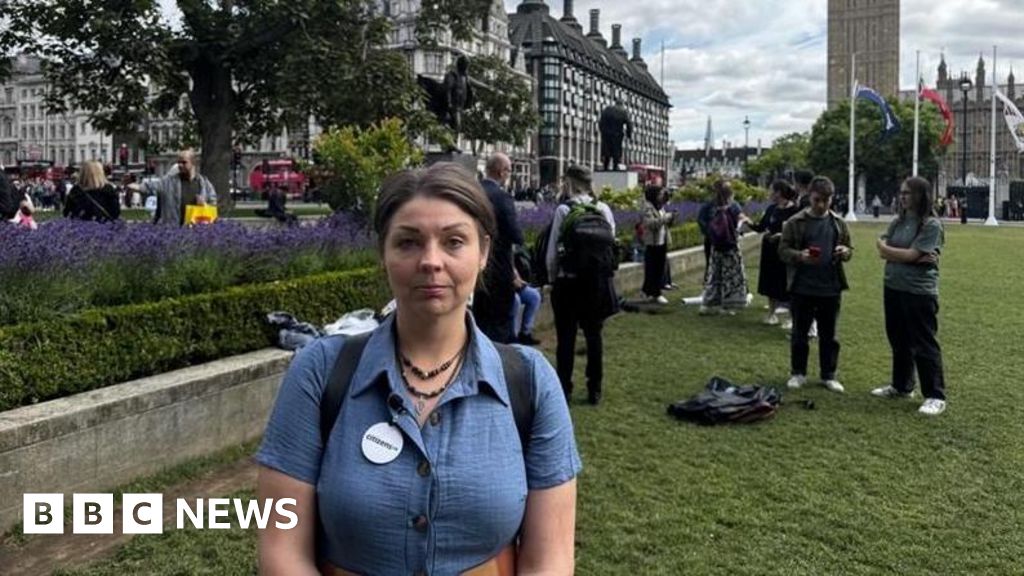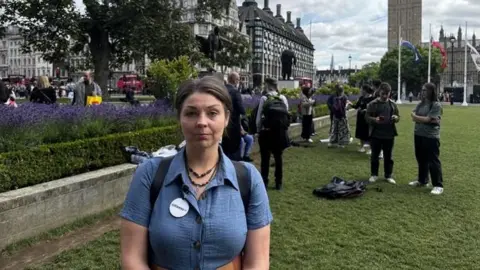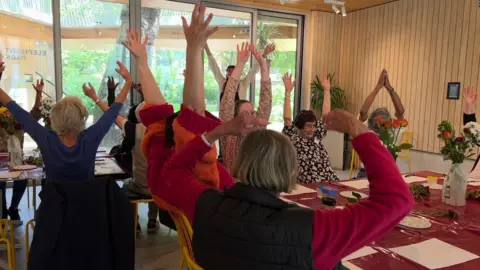Football
Carers in London: ‘We struggle every month’

By Lauren Stanley, Alpa Patel, Rita Monjardino, BBC News
 BBC
BBCCare workers, unpaid carers and care home owners are calling for reform to the social care system in London, ahead of the election on 4 July.
Last year, the vacancy rate in the capital was the highest in the country at 12.1%, equivalent to 22,000 vacant posts, according to Skills for Care.
The King’s Fund found just 39% of care workers in London earn the living wage or above – much lower than the rest of the country.
Former carer Suzie Lyle has been rallying with Citizens UK to call on the next government to pay care workers the London living wage, of £13.15 per hour.
‘Struggling every month’
“Me and my partner both live and work in London. We have got two children. We work around each other with childcare”, Ms Lyle said.
“We struggle and we shouldn’t have to, but we do – we’ve struggled a lot with basics.
“Sometimes we have gone to the foodbank. We can’t really look forward to things like buying a house or maybe a nice family holiday, it’s impossible – which is a shame.
“I was doing thirteen hour shifts. Really tough shifts some days and it did not reflect in the pay at all. We were struggling every month.
“To be a carer and to live in London is hard. ”

Vinod Patel has run the Mellows Care Home in Loughton in Essex for 21 years.
“It’s been a crisis over the last couple of years – ten, fifteen, twenty years – and nobody wants to deal with it. So it’ll always be a crisis”, he says.
“We lost about five or six staff in the last year who have gone to the NHS.
“They [the government] want a Rolls Royce service when really they want to pay for a little Mini.”
In Southwark at a workshop run by the charity Arts for Dementia in Elephant and Castle, Richard Spear looks after his wife of 30 years, Wendy, 63, who has early onset Alzheimer’s.

The centre provides arts workshops for people with earlier stage dementia and their carers across London with so central government aid.
Richard explains: “I can only provide so much. I need to take more of a break. I think it’s not a sustainable model, what I’m doing at the moment.
“Because it does take a strain because it’s 24/7 job and becoming more demanding.”
According to the charity Age UK, 2.6 million people across the country aged 50 and above are living without the care and support they need.
The Department of Health and Social Care estimates that 1 in 7 are facing costs of more than £100,000 for care.
Four years ago the government announced a plan that would put a cap on the amount someone has to pay for care costs throughout their lifetime.
The Conservatives, Labour and the Liberal Democrats have all said they are in favour of bringing in those reforms after the general election.

Asked what she would do if she had the keys to Number 10, Suzie Lyle, said: “I would make sure that the home care sector has a decent pay and it makes such a difference to how we do our job.
“That’s why we are in a situation where we are short of carers because the money’s just not worth it – it’s not worth the stress.
“It is a very committed job and it’s a job that you go into because you truly care about looking after people.
“But it doesn’t reflect in the pay, which makes it harder to attract people that genuinely would love to look after people.
“We need a real living wage. We need to support our carers who do so much for other people.”

If elected on 4 July, Labour said they will end the workforce crisis in social care, introduce a ten year reform plan, enshrine the principle of “home first” in social care, raise standards across the sector and support unpaid carers.
The Liberal Democrats said they plan to increase funding and reform social care. including a carer’s minimum wage set £2 above the minimum wage and creating a Royal College of Care Workers comparable to the Royal Colleges of nursing and midwives.
The Conservative party said that at the next Spending Review, they plan to give local authorities a multi-year funding settlement to support social care.
They said they would make reforms to shape the market for older people’s housing and support unpaid carers and implement a cap to social care costs from October 2025.
The Green party said they would push for free personal care for old age people and the those disabilities, increased pay rates and a career structure for carers.
The Reform party said they would simplify social care through a single funding stream, instead of the split between NHS and local authorities.










